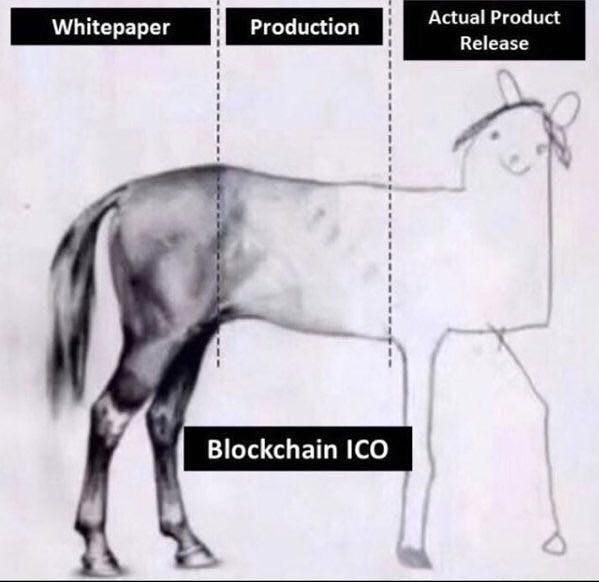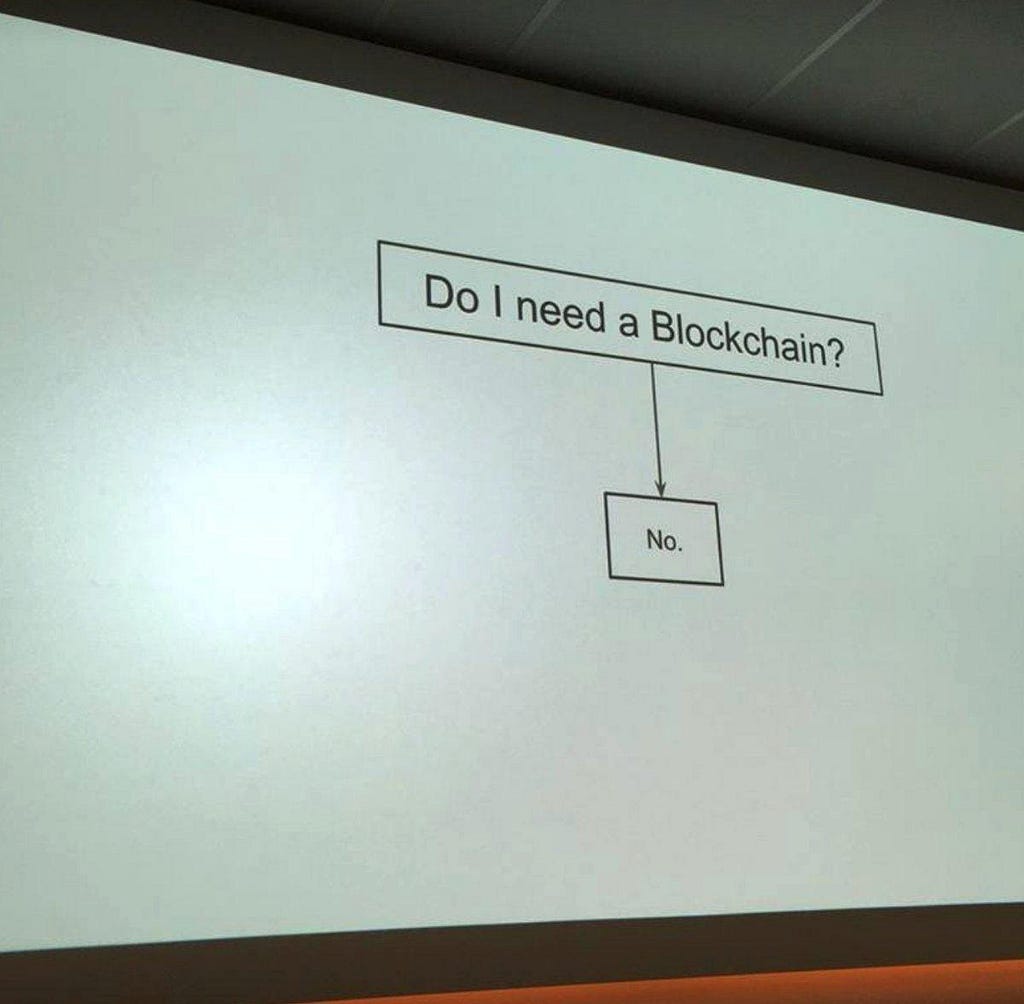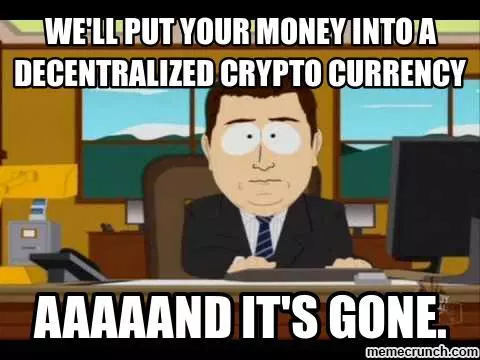Latest news about Bitcoin and all cryptocurrencies. Your daily crypto news habit.
 99.9% of Whitepapers
99.9% of WhitepapersPreface
This article is an extension to a submission the authors have made to the Australian Treasury during their information-gathering process.
We believe it’s critical for people to better understand what really happened during this mania, the skewed incentives that resulted and the ramifications of this blind excess. The ultimate aim is to help ensure something this deranged does not happen in a space with so much promise.
Please also note: Rory and myself are both 100% for free markets, choice and people’s right to do what they want — so this is not some request for socialist compensation.
This is an exposé.
The goal is to wake people up, and hopefully encourage some accountability in the space. Anyone considering an ICO should read this, and realise that what you’re thinking about is likely the wrong way to go about it. Anyone who’s done an ICO should take serious note. You’ve likely done the wrong thing, and whether your malevolence was intentional, or due to your incompetence, you should also be held accountable — whether legally, financially or reputationally.
The world needs some more skin in the game. Let’s hope this is a start.
Feedback is much appreciated, as is sharing this article broadly. It is applicable not only in Australia, but worldwide.
Introduction
In all of our collective experience, having been involved the Bitcoin and the cryptocurrency space, the capital markets, early-stage technology startups, and seed-stage fundraising, we believe to the best of our knowledge that the ICO fundraising model is at best misleading with borderline deceptive conduct, and at worst; blatantly fraudulent.
Why this is the truth is not entirely black and white, but in order to make the case, we will demonstrate how ICO’s have largely failed almost all participants, and further how those ICOs have been merely used as a Rube Goldberg machine to circumvent securities law and investor rights.
We first need to make the legal distinction that a participant funding an ICO is an “investor” and that the rational majority are only “investing” for the potential to profit. Thus, similar rights should apply as to all securities in terms of investor rights, equity, transparency, and information sharing between “fundraiser” and “investor”.
We must then also acknowledge that many of these ICOs willfully engaged in unethical marketing practices in order to entice “investors” and “speculators”, and not to actively seek potential “users”, achieving this by utilising popular cryptocurrency “influencers” to attract big-dollar “investments” from technically uninformed Australians.
Many “investors” were ironically unaware that they were even being marketed to, and that these “influencers” were paid for their services, as yet no marketing standards have been enforced in this space. The #AD laws regarding advertising standards to be upheld by influencers has been liberally disregarded in the cryptocurrency market to its detriment and the detriment of “investors”.
This deceptive behaviour has facilitated many uninformed “investors” to make “investments” extremely large, uninformed, investments into projects that will likely never eventuate. And, even if they eventuate the “utility tokens” may still be next to worthless due to being largely pointless. Most “investors” in Australian ICOs have lost their shirt, their pants, and their dignity, all for a zero-per-cent equity gift to fundraise a project that doesn’t actually need its own native “utility token”.
In this unethical fundraising model, the “investors” wear all the risk of an asymmetric “investment” and the “fundraiser” is exposed to almost none. The “investors” for taking this risk are given absolutely no rights, no transparency, no equity, and no legal recourse. On the other hand, the “fundraiser” is given access to extremely lucrative capital raising with little to no recourse, no need to give up any equity, no need to be profitable, or efficient, no need for transparency with “investors”, and absolutely no need to even deliver a successful project.
Let’s dive deeper and look at the core problems with running, or having run an ICO:
1) Non-dilutive capital raise
ICOs raised extremely large sums (in some cases tens of millions of dollars) whilst giving away zero equity. Yes — zero. I’m not sure how legal this even is. These so-called “projects” may have made out, somewhere in the fine print of their flashy whitepaper, that the tokens are “risky” or “have no value”, but the reality is that this entire concept was built on the narrative of
“retail investors are finally able to “invest” in early stage protocols/projects/business/companies (the entity irrelevant), and it’s no longer reserved for the sophisticated investors of the world”
The sad truth is that in reality “investors” were buying worthless tokens with no relationship or attribution back to the underlying entity, or any stock, share, debt, voting right or anything else to do the entity.
As a result, ICOs were able to raise risk-free capital and give investors a coupon for potential services called a “utility token”. They were told ultimately people would demand this token and that it would useable as money. We believe this term “utility token” has been used liberally to fleece “investors” through an overuse & complete lack of understanding of terms such as “blockchain”, “cryptocurrency”, “decentralization”, and the general lack of understanding the difference in function between a monetary unit such as “tokens” or “money”, and a “share” or “right”.
2) Unregistered securities
A security is any investment contract, and the now old, but still very effective, Howey Test suggest it is an investment contract if:
1. It is an investment of money;
An ICO investment is an investment of money.
2. There is an expectation of profits from the investment;
An ICO investor expects to turn a profit. Despite what some ICO issuers would say, who funnily enough had, and still have no product, demand, users, or anything else tangible.
3. The investment of money is in a common enterprise;
The decentralised platform is the common enterprise, and the investors have the utility tokens to prove it. Furthermore, businesses who used this method of capital raising to illicit funding from investors to funnel back into the enterprise that they maintain 100% ownership of, it is still representative of this classification.
4. Any profit comes from the efforts of a promoter or third party;
The project ultimately has to market and create demand for the token or else the price will sink.
Despite all claims to the contrary, all companies who conducted ICOs were in effect selling “utility tokens” for the purpose of speculation, hence there was always an expectation of profit, and that profit relies on the promotion and efforts of the underlying business that raised funds via ICO.
This is indisputable; else there would not have been an entire industry of marketing services that has formed around the promotion of said tokens. The two largest advertising platforms in the world (Google, Facebook) banned the sale of these unregistered securities for a reason.
Furthermore, if an ICO sold any single participant more tokens than they would need to only be a potential user, it was clearly an investment, and therefore inarguably they knew they were selling an unregistered security. Largely the buyers of these tokens were never intended to be “users of a platform”, and in just about all cases; those platforms did not exist, and most (if not all) to this day still do not exist. The “utility token” narrative is 100 per cent false, entirely misleading, and ultimately harmful.
I must make something very clear to the technically uninformed, “utility tokens” are not consumed, used, or even fundamentally necessary for the creation of almost all functional decentralised applications (dApps). We must define the technical difference between a platform token such as ETH, and a “utility token” issued atop a platform, one is necessary and the latter is not in practically all cases.
“Utility tokens” in general, functionally have no utility, and if you were sold otherwise, you have unfortunately been misled on their usefulness by those who wish to rent-seek. Once a “utility token” is sent to a service, they must then resell these tokens back into the market in order to make a profit; meaning ICOs must bootstrap a two-sided market, not merely a single-sided market.
“Utility tokens” are a hot potato with no true value and no actual utility.
“Utility tokens” generally almost all make no economic sense, and lead to inefficient, unsustainable, and simply unnecessary secondary markets that have been proven time and time again to largely consist of fake trading volumes, bots and market-makers wash trading in an effort to further entice people to continue gambling and subsidising their inefficient business model.
Ultimately ICOs enable fundraising that skirts regulation, giving “projects” which are just teams of people (aka: enterprises) a risk free, legal, lucrative way to attempt to raise capital whilst trying to “bootstrap” unproven markets for products that do not yet exist, for centralised services that don’t need “blockchain”.
These unregulated/unregistered entities took full advantage of ASICs lax standards, and then took full advantage of the public’s lack of knowledge of cryptocurrency — and ripped them all off, selling them extremely high-risk useless tokens that on reality are merely securities with no rights, ownership or recourse.
3) Marketing & Transparency
The sale of tokens on the secondary market is largely the business model for these “projects”. A large majority of these business expenditures is centred on marketing efforts to attempt to raise demand and therefore raise the price of the token. They attempt to bootstrap the “network” by continuing to market, and to sell the companies excess tokens into this speculative market, often despite not yet having an actual product. This is an entirely speculative market as purchasers of the token are again largely, if not entirely, not “users” of the platform, merely “speculators” and “investors”.
These secondary markets can be unfairly influenced by paying cryptocurrency “influencers” and publications for marketing. This can create misleading marketing efforts by putting out leading press-releases, drumming up the illusion of success and partnerships without any true achievements in an attempt to pump the token price. These campaigns rarely ever acknowledge that these are in fact paid ads or marketing campaigns, and “influencers” unethically almost never acknowledge #AD’s as per advertising standards.
These practices have been used liberally to skirt laws around marketing and create yet again more “speculators” “investing” in a protocol (some cases) and worse, a “product” or “business” that does not yet exists.
 No difference between this guy & the rest
No difference between this guy & the rest
“Influencers” in cryptocurrency have made millions of dollars advising ICOs, the term advisor in a cryptocurrency project is in fact incredibly misleading. Most advisors are merely marketing these ICOs and their advice stops there.
In effect, they are selling unregistered securities to uninformed fans and operating with truly deceptive and unethical marketing practices. There is absolutely no transparency around what “advice” these “influencers” provided to receive generally in the realms of 1.5% of the entirety of all tokens issued, nor does there seem to be any kind of vesting periods (as if that would matter anyway). This has led to very dangerous underlying incentives that had influencers with “skin in the token-speculation-game” eager to drive, promote, and market the token merely to increase the number of speculators to sell to.
4) Payment In Tokens
Founders, employees, advisors, and the company generally make up a large portion of token holders on extremely lucrative terms of dollar cost. They are generally given these with very little terms of sale and or holding/vesting schedules (again, as if that would matter).
Terms frequently spoken of are never enforced and there is a complete lack of transparency here. There is generally no requirement to meet goals, milestones, or deliver deliverables that would traditonally be required in order to run a business.
What’s worse in this scenario is the complete hypocrisy related to taking money in for the sale of made up tokens, whilst maintaining 20, 30, 40, 50 and even 60% of those made up tokens in their own treasury!!
So not only have these projects literally created a valueless “asset” (if I can call it that) out of thin air & sold it someone (therefore taking money in), but they retain the large majority of “tokens in market” for themselves.
If that’s not the definition of double dipping; I don’t know what is.
They create a market, drive the price of the tokens up by simultaneously restricting the supply (artificially) and listing on an exchange, and when the price of the token is squeezed upwards, they enrich themselves as holders of the majority of tokens and sell it to “investors” at the top of the market.
There is absolutely, positively NO ethical reason in the universe we live in, that these ICO issuers should be able to not only sell the worthless tokens and get money for them (which gives them a market value), whilst also being allowed to then be attributed a portion (large at that) of the total network supply which they can sell to people later.
It further reinforces the blatant cash grab that this ICO fiasco was, and any team, company, group or project who both took money in AND kept tokens for themselves should be taking a long, hard look at themselves — as should the buyers of said tokens, and the authorities.
5) Businesses doing ICOs / requiring tokens
There is a simple litmus test one can use when looking at the need for a token.
If it’s a network that is not owned by anyone but is more like a public “commons” such as Bitcoin, then it requires its own monetary/economic model that incentivises the validators (miners), judges (node-operators) and holders (users) — in other words; all participants — to support the network, and maintain its integrity.
Whilst we disagree with the ICO method via which Ethereum raised the capital to initially bootstrap its network (eg: Bitcoin was not “sold” to anyone, and no money was raised — it was 100% organic), and probably disagree with the idea that it’s properly decentralized; one could rightfully point out that it’s network represents one that is more in line with Bitcoin, and in order for it to operate, it requires a token for the same reason as outlined for Bitcoin above.
So it follows that if someone / a team, or a “project” is purporting to build such a decentralised network; then there is an argument for a token to exist, although please note, it does not mean it requires an ICO, and furthermore, the incentives around an ICO capital raise will generally lead to the opposite incentives than those needed to build a strong network with fair distribution.
Businesses on the other hand, which have real-world equivalents that are functional, commercial, operational, or even non-commercial & making a loss, but still exist or could potentially be built as a business or product WILL NEVER require a token. Not under any circumstance.
There’s a number of problems here.
1. Hammer looking for a nail
Most of these businesses, their founders, their advisors & their team know, beyond a shadow of a doubt, that their product or business does not need a token in order to function.
To combat this they proceed to develop a narrative of “why” they need a “blockchain” in order for their business to actually work “in this new digital age”.
They focus on creating an elaborate “network”, or some new “proof-of-something” based Blockchain that the tokens they issue will need to operate on in order to their business to be more efficient, or their product more functional.
I am yet to see an example of such a network that can justify the existence of not only it’s “proof of something” blockchain, but the value of the token that is supposedly “critical” to the entire concept that they needed to raise money from people to build it.
 The reality of mal-incentives.
The reality of mal-incentives.
The businesses are almost all examples of blatant cash-grabs where they created a narrative full of technobabble designed to confuse, that nobody ever really understood, just to justify the existence of a token that was not required; of course; in order to then “need to do an ICO”.
There is no exception to this rule; whether for ATM machine businesses, supply chain products, exchanges implementing their own token, or for micro investing / roundup applications that have popped up with what seems to be a good idea; and have used that basis as a reason to fleece people of their money for an unnecessary token.
There are completely legitimate businesses that exist that are direct proof that the token is ultimately not needed, ie; Acorns, Coinbase, TravelbyBit, Amber.
2. Moral Hazard / Inconsistent Incentive
Are these “projects” building a business or are they merely maintaining a Ponzi-style ‘token economy’ network?
Building a business is hard enough; having to also manage a micro-economy that’s at the whim of pump & dumps, fake-liquidity exchanges, low volume and complete hype is totally & utterly impossible.
When push comes to shove, these teams will focus on what actually makes them money (this is where their incentive is). And what makes money is not trying to gamble on a token which you have created out of thin air & sold to people (great way to get what’s called “REKT”), but taking the real money they got in return for the fake token they sold & trying at least to run a business, which they own 100% and can profit from long term.
Let me be clear:
- They got all the money upfront. It’s free money. No dilution, no accountability, no nothing.
- They can then either spend their money trying to prop up the value of the tokens they sold you (very unlikely unless they’re extraordinarily dumb), or they can go ahead and build their business, develop their product and make some money.
You, the token holder just got…wait for it….shafted!
We call it:
Charity without a cause…
There are 3 categories of “team” or “project” to note here:
- Those who took the money and ran (direct scammers)
- Those who took the money then tried to trade it & got rekt (Darwin award goes to….)
- Those who took the money, and then funnelled into their own business (or another business idea) for their own benefit (remember; they own 100% of it — you own nothing).
I would say #3 are actually the worst — because they’re still out there. They claim to have “hung around” and “built” or are still “building” the product, and people (or token holders) are too ignorant to notice the reality: They just took your money, bought brand new cars, paid themselves handsomely, and built a company. Instead, the community simply praises them for actually building something.
Their the most sinister, because they’re still around, they’re still doing their thing — and whether they’re explicit scammers, or genuinely deluded enough to have so little concept/understanding of basic one plus one economics, to think they’re doing the right thing — it doesn’t change the fact that they’ve absolutely misled their “investors”, and the people who look to them for advice.
If those “investors” were told the truth in the first place, ie; “your payment is a charitable donation to our cause, ie; the business that we’ll make money from long term”, I guarantee you nobody, except the completely deranged, would’ve “invested”.
The incentives are misplaced, and the moral hazard is real.
6) Unfair advantage
Last but not least:
One man’s incentive is another’s dis-incentive.
The government and the broader ecosystem should be supporting entrepreneurs & innovators who do the right thing. I mean; that’s assuming we want a society that focuses on productivity and not rent-seeking and fleecing unwitting “investors”.
The problem with allowing those who do the wrong thing (ICO issuers) to get away scot-free, and in fact with large sums of money; indirectly dis-incentivises those who are working hard to do the right thing, selling chunks of their company and working day & night to get something tangible off the ground.
Innovation is hard. Building a legitimate business is extremely hard. Making it commercially viable is even harder, and when one needs to compete with those who have cheated their investors and the system, it just makes it even harder & incredibly unfair.
Is this the experience and ecosystem we want to promote in order to support innovation? I think not. The incentive is to raise money, not solve problems.
In fact; the definition of a “successful ICO” was and still is — “How much money we raised”.
Seriously???
The result was almost zero innovation in the blockchain and ICO space (outside of Bitcoin). The only real innovation was how to get money out of people with no recourse or accountability — so if we can say they were successful at something — it was that.
The sad part is the aftermath of all this has led to a weakened cryptocurrency market in general.
Real businesses who stayed the course and done the right thing have been severely impacted by losing staff to ICO peddlers that paid developers & marketers $300k a year. They have significantly less capital to work with than their ICO peddling counterparts, they have to work longer hours, push their remaining people harder and fight uphill battles against teams that have an unfair advantage.
It’s no wonder we saw little innovation.
The entire space wound up skewed with the wrong incentives and the wrong people were rewarded for the wrong behaviour.
Conclusion
ICO’s should be relabelled as “Illegal-Coin-Offerings”.
Tokenomics, incentive models, proof-of-whatever and all of this other rubbish branded under “blockchain”, is just a hammer looking for a nail.
Almost all projects using the term “blockchain” are doing so to illegally fund their projects, and from a technical standpoint, are only truly succeeding in making some of the costs of their technical infrastructure orders of magnitude more expensive than using a simple, centralised service, sometimes millions of times more so.
The very fact that the entities exist as “companies” who need to sell tokens back into the market realistically means they cannot function in a decentralised manner at all, thus are largely selling a complete and utter fallacy wrapped inside a lie.
 From a talk given by Aleks: https://youtu.be/5c02o8WwYAk
From a talk given by Aleks: https://youtu.be/5c02o8WwYAk
While there are some phenomenal innovations in this space, particularly from those who are working on open source, grassroots projects (like Bitcoin), it is largely been taken over by charlatans selling what they cannot deliver on because of the asymmetric level of technical knowledge (or technobabble), and the arcane nature of “blockchain”.
Bitcoin is a very different concept; it was never sold to anyone, there was never an ICO, it was a something that grew spontaneously of the internet — and no individual profited from selling it to unwitting investors.
ICOs, on the other hand, took advantage of people’s misunderstanding of Bitcoin, cryptocurrency, and the so-called “blockchain” technology (which is ephemeral at best), and were sold unregistered securities on the basis of two false narratives:
a) You’re investing in early-stage ideas/protocols/ companies
b) Exchange listing / You’ll be able to sell your tokens on an exchange later (implying an increase in value would take place)
This kind of behaviour must be called out, and as mentioned at the outset, those who participated and profited from should must be held accountable, if not legally & financially; at least reputationally. (I know it’s not a word).
I hope our comments will assist with there being some form of recourse for Australian ICOs in particular; as allowing them to continue on without either paying back their original investors or part with their equity, is just going to mean there was no consequence to their actions.
We have refrained from referencing particular projects in the article, but welcome anybody to do so in the comments section below.
This article was co-written by Aleksandar Svetski & Rory Highside.
Opinions are our own, but are surely echoed by many.
If you’ve read this far, please share this.
Let’s make some noise & drive some awareness such that this kind of stupidity does not happen again, or is at least harder in future.
You can follow the authors here, on Twitter:
ICO Submission to the Australian Treasury was originally published in Hacker Noon on Medium, where people are continuing the conversation by highlighting and responding to this story.
Disclaimer
The views and opinions expressed in this article are solely those of the authors and do not reflect the views of Bitcoin Insider. Every investment and trading move involves risk - this is especially true for cryptocurrencies given their volatility. We strongly advise our readers to conduct their own research when making a decision.




